Thirty Years of AmRen Conferences
AR Staff, American Renaissance, November 18, 2024

Subscribe to future audio versions of AmRen articles here.
Last weekend’s American Renaissance conference marked the 30th anniversary of the very first conference we held, in 1994. This was a milestone that we marked with celebration and thanksgiving.
On Friday evening, Assistant Editor Henry Wolff opened the conference, noting that AmRen was being canceled “before it was even cool.” Despite (or perhaps because of) our measured, thoughtful approach, American Renaissance has suffered relentless deplatforming from banks, services, and social media. “We always seem to be the first ones to be canceled,” said Mr. Wolff. “The question you have to ask is why.” Nonetheless, our conference is now well established at the beautiful Montgomery Bell State Park in Tennessee, which has almost become our home away from home.
In his opening remarks, Jared Taylor paid tribute to those who spoke at the first conference, and read hearty greetings from Dr. Wayne Lutton, Rabbi Mayer Schiller, and Fr. Ronald Tacelli, S.J. He also remembered Sam Francis, Lawrence Auster, and Joe Sobran, an incredibly influential trio on the American Right, who all spoke at the first conference. Mr. Taylor noted regretfully that he had lost touch with Prof. Michael Levin of City University of New York and with independent philosopher Eugene Valberg, but remembered them with vivid anecdotes.
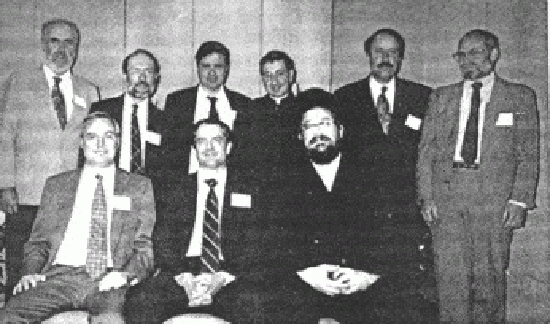
In the first speech on Saturday morning, Jared Taylor argued that President-Elect Donald Trump will slow the rot in the United States but cannot stop it. “To make America great again,” Mr. Taylor said, “he must make America white again, and that is something he cannot do.” America needs revolutionary change, which must include at least the following: widespread recognition of the colossal societal implications of race difference, repeal of the Civil Rights Act of 1964, and official government sanction of the right of whites to go their own way.

However the new regime unfolds, Mr. Taylor argued that racial separation must be our goal, noting that separation is older than the country itself. “Separation motivated the Pilgrims,” he said, “the Catholics of Maryland, the Revolution, my Confederate ancestors, and countless Christian splits and schisms. Some differences cannot be reconciled, even among people who are supposed to love their enemies as themselves.” Separation, including measures short of outright leaving the Union, could provide a basis for whites to secure our existence in North America. Conscious white communities are an important strategy. “We must have a house that is ours and ours alone,” he said.
Prof. Amy Wax of the University of Pennsylvania Law School said that she used to reject the label of race realist, but now accepts it. She compared the process of becoming a race realist to climbing a ziggurat, with political and psychological obstacles at every step. The first is refuting the idea that race is not even biologically real — a false belief that is promoted and rewarded by the political and scientific establishment. Even empirical statements about race run into the moral claims of what she called the “equalitarian” delusion.
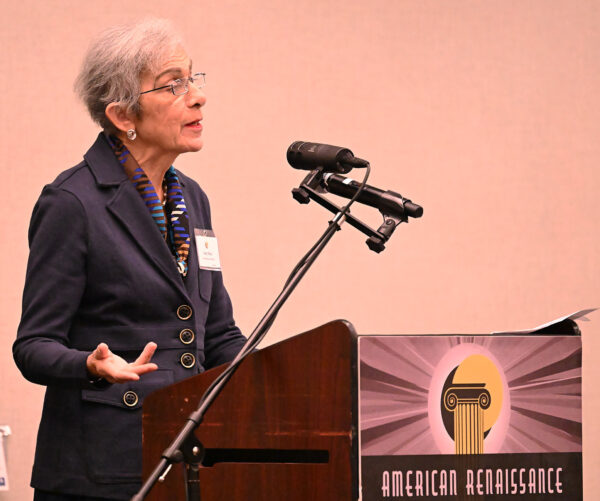
Prof. Wax challenged the conviction that indulging this false belief is necessary for social peace, arguing that it inevitably devolves into blaming bias, racism, the West, and ultimately the nature of whites themselves for all racial discrepancies. The growth of government and demands for more social control are an inevitable consequence of the demand for equity. “It entails the suppression of facts and the growth of censorship,” she said, and leads ultimately to mass humiliation: Millions are forced to pledge fealty to principles and goals in which they do not believe. “We should all favor facing reality and be willing to sacrifice for the truth,” she concluded, to a standing ovation.
Austrian identitarian activist Martin Sellner was banned by our rulers from setting foot in the land of the free, and had to address the conference by live video. He explained his goal — remigration — in light of three rules: There are no immutable dogmas but simply shifting consensuses, voting does not automatically lead to power, and politicians are not leaders but followers. The idea that immigration is a force of nature like the tides or the winds is just an artificial consensus. “We need to make the idea of remigration very well known, and then make it moral, positive, and hopeful,” he said.
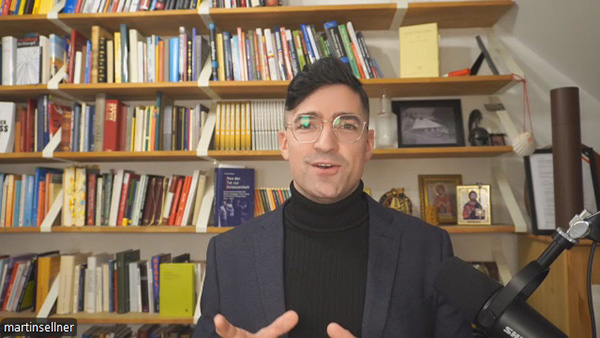
Though millions must go back, even vanguard activists must be realistic and not make wild demands. Instead, via his method of “popular provocation,” ideas with mass support can be implemented in stages and advocated in common sense ways that appeal to moral principles. This does not mean losing sight of what is important for our own people. “Give a man a fish, feed him for a day; deport a man, and you will never have to feed him again,” he joked. On a more serious note, he told activists, “Never make your peace with this vile project of the replacement of our people.” Instead, “call it out and destroy it.”
Prof. Richard Marksbury, retired after 43 years at Tulane University, spoke on ethnonationalism and argued that everyone is inherently “racist.” When he began studying anthropology, he was taught that culture was a kind of “super-organism” that determined everything. However, human nature is shaped by humanity’s evolutionary experience of living in small homogenous bands until the development of agriculture. Small-band tribalism accounted for 99.99 percent of our existence as homo sapiens, and formed our nature.
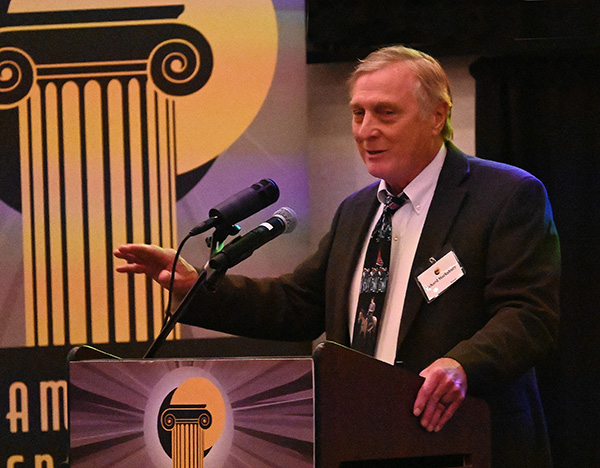
Prof. Marksbury traced the development of American constitutional history and said that the triumph of the federal government in the War Between the States inevitably led to increased attempts to control the white population, and to the turn against traditional values and culture. There is intense opposition to centralization in separatist movements all around the world, and they are almost always based on ethnonationalist identity. Such movements, he argued, strive to achieve the best way for human beings to live according to our nature. White Americans should be considered an ethnic group, and the traditional symbols of the United States belong uniquely to us.
Gregory Hood, AmRen’s star writer, argued that white advocates received a “stay of execution” with the election of Donald Trump. He said it is too early to be optimistic or pessimistic about the administration, but we must use the next four years building power in the real world because the inevitable crisis has been delayed, not prevented. When that crisis comes, those with some measure of power will exploit it, often molding their ideology to meet new circumstances. Ideological correctness, therefore, is less important than the ability to mobilize real-world networks and to build power at the local level. Open white advocates, he warned, should not assume they will get any roles in the administration, but should not give up on essay-writing and original reporting that could drive policy changes.
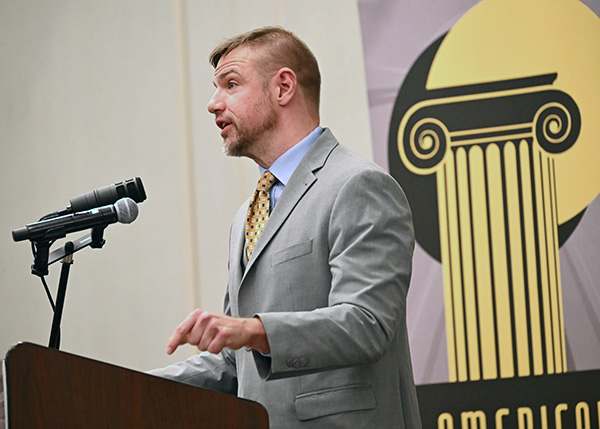
Veteran broadcaster Anthony Cumia gave a hilarious after-dinner talk about his career in broadcasting. He got his big career break after making a parody song about O.J. Simpson to the tune of “Sitting on the Dock of the Bay.” It became a great local hit and was his springboard to becoming half of the “Opie & Anthony” show, which debuted during the golden age of “shock jock” radio. Regulation and consolidation bought that to an end. Due to regulatory changes under the Clinton Administration, hundreds of radio stations were swept up by immense conglomerates, so there were no longer identifiable station owners to whom program hosts could appeal if there was controversy. Political correctness increased and activists could more easily lobby for content control, because “headquarters” saw radio as just one part of diapers-to-dogfood empires.
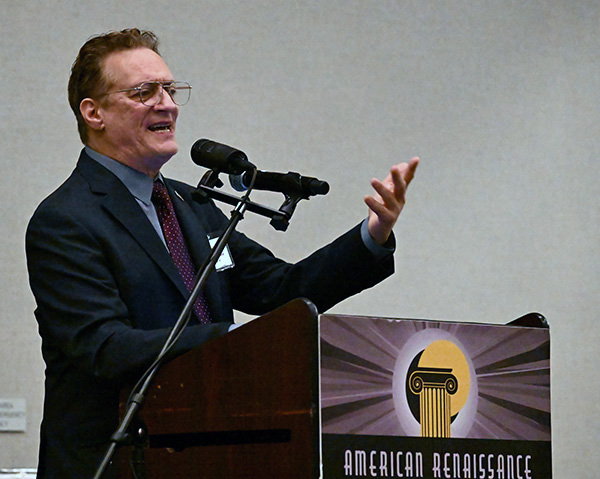
Mr. Cumia told a remarkable story: After he was suspended for a mild racial joke, the network made a big donation to Al Sharpton’s National Action Network and gave it a radio show in compensation. Now totally independent with regular shows of his own, Mr. Cumia called for the restoration of free speech and marveled at the opposition American Renaissance faces. “Talking about our beliefs is the most fundamental thing we do as Americans!” he exclaimed. “And people try to destroy us for it!”
On Sunday morning, Guido Taietti of CasaPound spoke on the differences between European and American identitarian movements. European movements often have brick-and-mortar headquarters in different cities that can hold events, educate people, and offer jobs to deplatformed activists. He argued that Americans should adopt the European approach of developing comprehensive political programs, rather than sticking to just a few issues, such as immigration or white identity. He noted that CasaPound has long had well-thought-out positions on nuclear power, for instance, and this gives it entree to mainstream discussions. Mr. Taietti also argued that one of the problems of the Anglosphere Right is that it constantly looks for solutions within the system rather than challenging the system itself.
However, Mr. Taietti said that Americans have lessons to offer Europeans, particularly our emphasis on white racial solidarity rather than refighting the white-on-white nationalist struggles of the past. In this context, he endorsed Jared Taylor’s concept of a “World Brotherhood of Europeans.” Mr. Taietti also expressed some hope for Donald Trump. He is not a “white savior,” and his real test will be what he can do about illegal immigrants.
Sam Dickson was the traditional closer. He said that many of our virtues and strengths have been turned against us, especially our predisposition to abstract reasoning, moral universals, and living in the imagination. With these, whites conquered the natural world, but they also mean that many whites, especially educated whites, live in a world of illusion. Instead of defending families and nations, whites — especially Anglos — insist they are fighting for abstractions such as “freedom” or to “make the world safe for democracy.” Mr. Dickson cautioned that we will not be thanked for freeing people from illusion and false belief, but in order to do so, white advocates must confront our own flaws, including excessive individualism and an unwillingness to be team players.
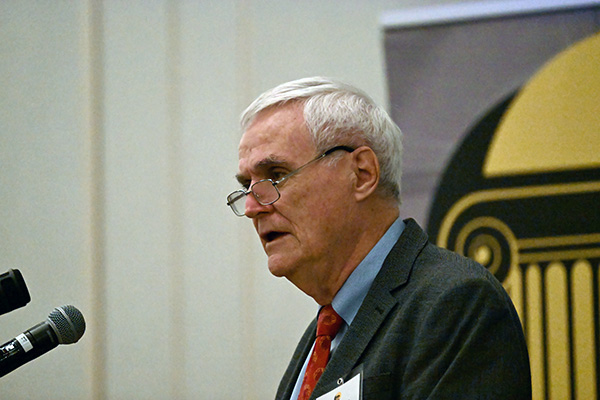
Protestors, who in the past used to be a bother, were few and held at a distance.
The large audience was optimistic after Mr. Trump’s victory and there were many side discussions on local, practical plans. Each year, the attendance gets younger and the movement gets stronger. The wind is at our back. Now is our opportunity. We must use it to the fullest.
















